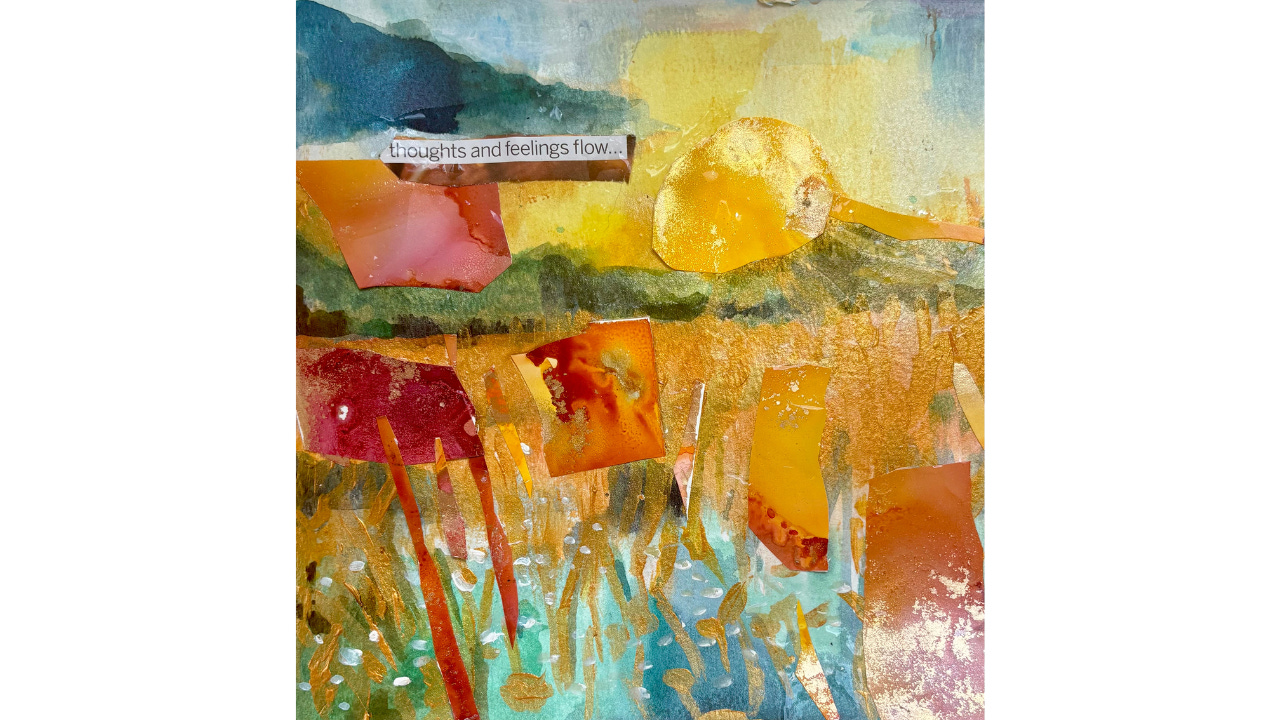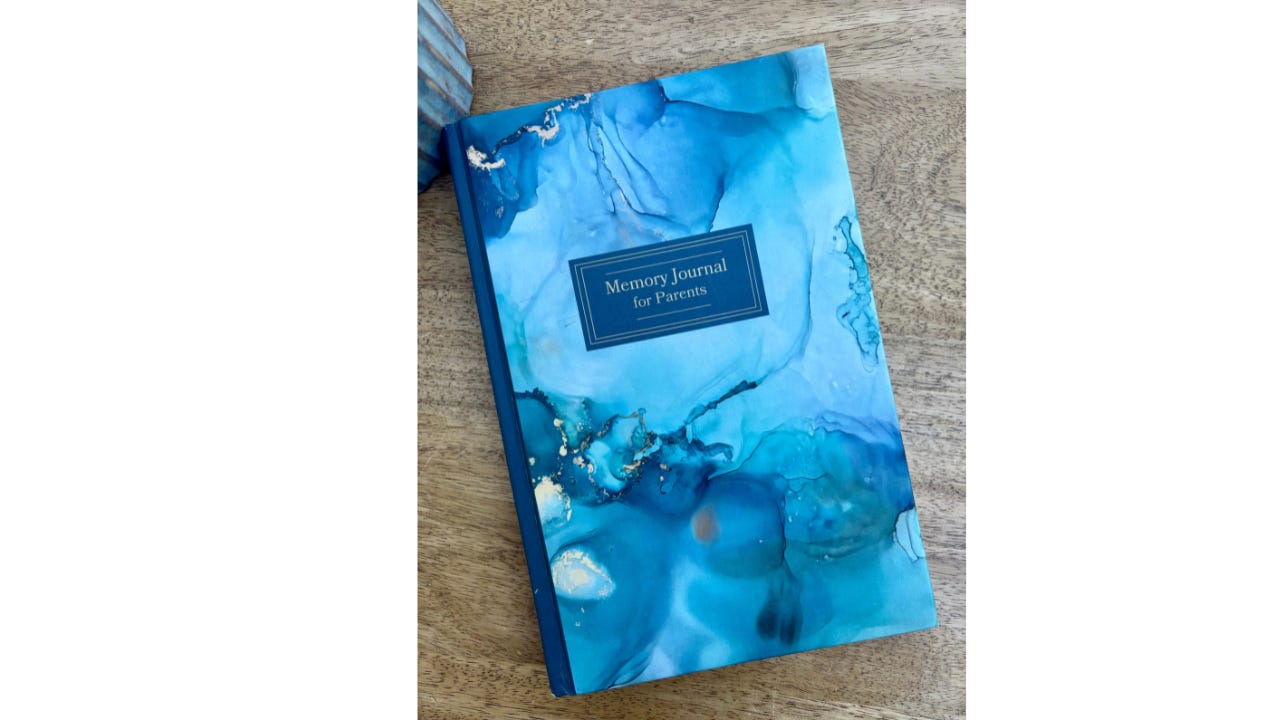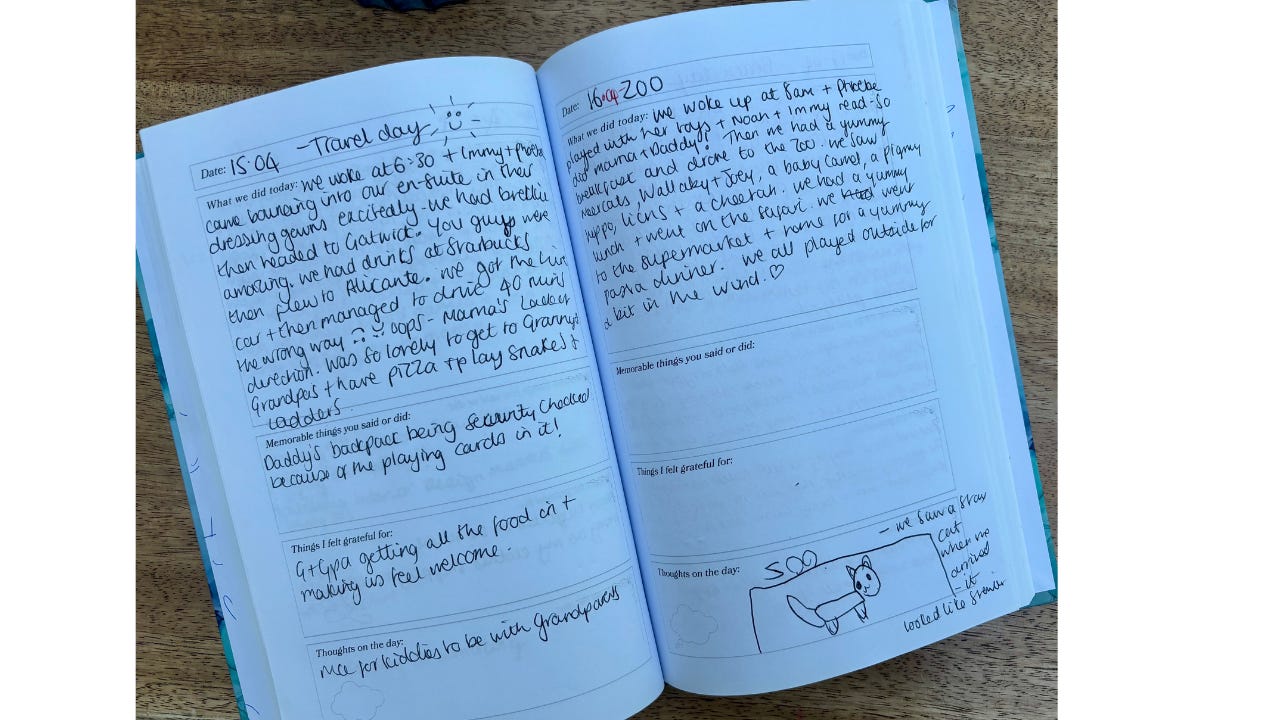Journaling That Sticks: How I Built a Simple, Soulful Routine
Why I love journalling and how it can help shift your mood
Why I love journalling and how it can help shift your mood
I love journaling because it is empowering, helpful, free, and simple to do.
When I first started journaling it felt a bit like going for a run - stick with me here - I didn’t really want to do it, but I always felt better afterwards.
Plus, like running you can just grab 10-15 minutes and journal whenever you want. Also, I found the more I did it the more I wanted to do it, and the easier it got.
Now, I may not have turned running into a daily habit (yet… there’s still time), but some journalling practices have turned into a daily habit and others a weekly habit.
I think there can be things that put people off journalling - a lack of clarity on how to journal, a bit of overwhelm on which journalling technique to choose. And for me there was some fear (particularly around the free writing, which I will write about lower down) around what thoughts might come out, or what emotions I might access.
There are many ways to journal and lots of benefits - it’s taken a bit of experimentation over the years for me to create a routine around journalling.
I’ve read loads of self development and coaching books and listened to loads of podcasts, so I’ve picked up a lot of ideas - I found some really helpful while others felt like a chore.
Every evening
I generally journal in the evenings - I would love to journal in the morning, but the age my children are means that there’s at least one night-time visitor, so I struggle to wake up any earlier. And on the rare occasion that I do wake before they wake me they seem to sense that the little light is on, or that I’m writing and come in. So it’s just not worth the risk!
Plus, I love an early night and have grown to enjoy journaling before going to sleep - it feels like a bit of time for myself that’s beneficial to my sleep, overall mood and well being. These are my tried and trusted evening-journaling practices in the order I practice them..
Gratitude
Pretty much my favourite ever journaling technique, and one I’ve been practicing the longest - 10 years or so. Again, there are loads of different ways to practice gratitude journaling and you can even buy gratitude journals - I just use a nice hardback journal for all of my evening journalling techniques.
My favourite gratitude journaling practice is one I read about in The Magic by Rhonda Byrne (which I preferred to The Secret. The Magic is a book dedicated to different gratitude practices that I re-read every couple of years or so).
Every evening before bed I begin by writing three things I feel grateful for and why. The wording - ‘I am so deeply grateful for …. because’ is from The Magic - you could change the wording, but I really like it, because this wording means that the statements you write become affirmations, that focus on how you feel as much as what you have. Here is one of my evening’s gratitude affirmations/statements:
I am so truly grateful to my daughter for suggesting that we go cycling in the woods because it was really fun and reminded me how much I enjoyed bike rides as a child.
I am so deeply grateful for the commission for three paintings because I love working to a brief and creating something for someone’s home.
I am so truly thankful for my lovely sleep last night because I feel calmer and more energised when I have a good sleep.
I stick to writing just three before bed, but I will often note three more in the morning, or after lunch. I notice that writing these affirmations quickly makes me feel more positive, and helps me reframe if I’m not feeling in a great mood.
If I ever feel stuck about what to write I think of all the things I can easily take for granted, and know I would miss if I didn’t have them. For example, my health, my family, having a home.
Gratitude is great to journal on because it doesn’t take long and it makes me feel positive and lighter as I’m writing. I will read each one statement back after I’ve written them to let the words sink in.
Three right things
This is the most recent addition to my routine but one that stuck super-fast. I’d heard of this idea before but read about it again in Do This Before Bed by Oliver Nino . I really liked the way he explained the technique, so started doing it regularly. It’s so simple and quick - I just write bullet points.
The idea is that you jot down three things that you did ‘right’ - you can expand upon it to write about your involvement in why it went right if you want to.
I love the fact that it gets you thinking about your day as a whole, and especially as a mum, all the things you have achieved, whether they are ‘big’ or ‘small’.
As a parent it can be so easy to focus on all the things you didn’t do, or you feel you did ‘wrong’. I love how this shifts the focus and gets me thinking about things that matter to me and what I want to do more of. I wish I’d known about this when my children were newborns.
A recent entry:
Coaching session - brave and intuitive
Made time to bounce on the trampoline with my youngest
Walked in the woods
Sometimes I will write more, but I usually stick to three and just think of others and then put my three top ones of the day.
Vison journalling/ future journalling
I like doing this after the previous two, as both of those practices get me thinking about what I want more of.
There are so many different ways of doing this, but the idea is to think a day ahead and imagine what you want to feel or happen. I like to focus on how I want to feel as, ultimately, that is way more in my control than what actually happens.
Usually I write a list of words and phrases - rewarding and satisfying work, sense of achievement, connection - affectionate with kids and husband, friendly interactions - calm, focused, friendly.
Sometimes, particularly if I’m nervous about something, or want to harness the power of my imagination for good rather than worrying! I will write a longer and more detailed description of my day ahead in the past tense. Always in the past tense - it’s a technique I learnt when training as a hypnotherapist and hypnobirthing instructor. You see, your subconscious can’t tell the difference between a real or imagined event - it’s why nightmares and dreams feel so real and why you can cry watching a TV show where something sad is happening to a character.
So, I would start with something like - wow what a great day, I felt calm and energised….and then go onto describe why and how I felt and an overview of what happened.
Some people can do this simply by closing their eyes and imagining the day ahead. I’m hoping one day to be able to do this, but for now I need to write it down and then read it back, otherwise my mind gets distracted and I lose my train of thought.
Weekly journalling
Free writing/expressive writing/morning pages
I tried this years ago when I first read about it in Julia Cameron’s The Artist’s Way she talked about Morning Pages in which every morning you write a few sides without editing and just let everything flow out. This didn’t really work for me though - I found that I moaned a lot and it felt a bit purposeless. Although I know loads of people love this approach.
Instead, I use this free writing idea when I’m feeling sad or angry and I’m not sure why, or my mood isn’t easily changing. I also use it if something has happened that has really upset me - after my mum died I would just write and it helped so much.
Sometimes it was obvious why I was upset and the writing helped me process it - kind of like coaching myself, validating feelings and holding space. Often through journalling I discovered that the root of what was upsetting me wasn’t what I thought it was.
Sometimes I felt like I didn’t want to write about it as I knew it would make me cry, or feel overwhelming but writing helps us process and organise our thoughts.
I was listening to a great episode of the Mel Robbins podcast with Dr Ethan Kross. In it he talked about how, because we learn at school to write stories with a beginning, middle and end, there’s something helpful in writing out our thoughts - as we naturally organise them and can resolve our thinking by writing it out.
Getting thoughts out of our head and onto paper can help us make sense of what we’re thinking and why we’re thinking it.
For me it feels really empowering to work through something by writing about it - then I can rip up what I’ve written or even burn it - safely of course.
Memory journalling
When my husband and I had our first daughter we wanted to find a simple journal to record all the small big things. All the everyday things and all the firsts. We couldn’t find one we liked so we created our own - and used my artwork as the cover.
It’s become a record of our family time together. I write in it at the weekends or on holiday. Sometimes it does feel like just another thing to do, but it’s so lovely to read back over, as I often forget what we have done and the cute things the kids have said. You don’t need a special journal to do this but if you’d like one - ours is hardback and on sale on amazon - Memory Journal for Parents
If you’ve made it all the way to here - well done! This is a much longer post than I originally intended and has made me realise how important journalling has become in my life, and how often I do it.
Are there any journalling techniques you love that I haven’t mentioned?
I love reading and buying books - this post contains Amazon affiliate links. If you click and make a purchase, I may earn a small commission, at no extra cost to you.




